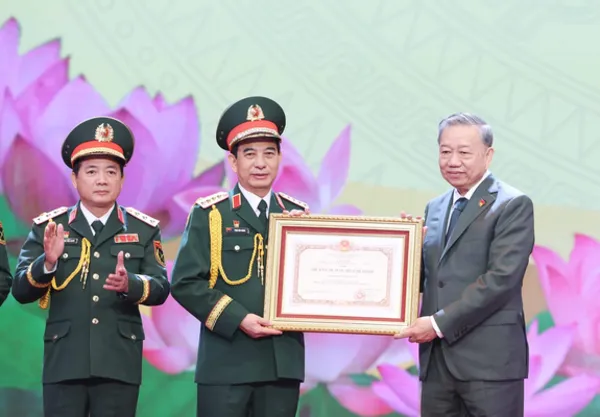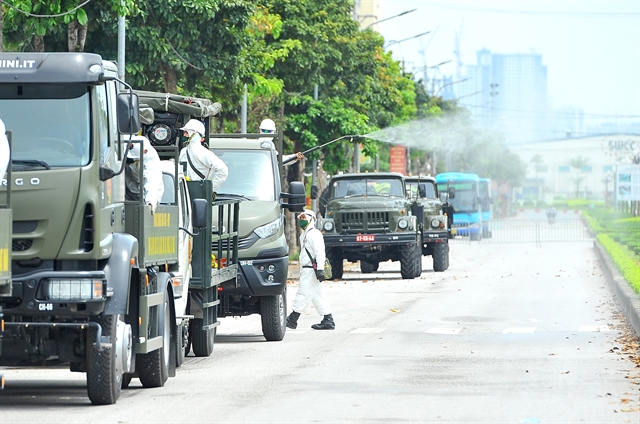 Politics & Law
Politics & Law

 |
| The Chemical Corps disinfected the National Hospital for Tropical Diseases in Đông Anh during the COVID-19 outbreak in Việt Nam in 2021. — VNA/VNS Photo |
*Colonel Phan Sỹ Phúc
HÀ NỘI — Over its remarkable 80-year journey of combat, triumph and growth, the Việt Nam People's Army (VPA) has steadfastly embraced its dual role as a "combat force and working army" in all circumstances.
Upholding the principles of self-reliance and resilience, the VPA has actively engaged in labour, production and economic development through innovative and adaptive approaches, making significant contributions to the nation's achievements.
Following national reunification, the VPA emerged as a vanguard force in healing the wounds of war and driving socio-economic development, particularly in strategic and vulnerable areas. During the subsequent periods of renovation, integration and industrialisation, the VPA effectively implemented the directives of the Central Party Committee, the Central Military Commission and the Ministry of National Defence. Its tightly coordinated efforts have successfully merged defence with economic development, aligning with the Party's vision of strengthening socio-economic progress and national defence. The results have been profound and far-reaching.
Economic defence zones: A legacy of integration
In line with Party directives, the VPA has established economic defence units and constructed dozens of economic defence zones in strategic, remote and border areas, as well as along coastal and island regions. These units, in collaboration with local authorities, have relocated communities, alleviated poverty, created jobs and secured sustainable livelihoods for hundreds of thousands of households. These initiatives have also led to the formation of clustered settlements, bolstering the people's defence posture and fortifying national unity. This work exemplifies the VPA’s vital role in the nation’s construction and defence efforts.
Throughout its history, the VPA has excelled in its role as a "working army," fostering strong ties with communities and leveraging public support to fulfil its missions. During wartime, officers and soldiers lived and worked alongside the people, forming a bond likened to "fish and water." This close connection became a powerful source of moral and material strength, enabling the VPA to meet its responsibilities with distinction.
In the new revolutionary era, the VPA has implemented impactful programmes that resonate deeply with communities. These include supporting rural development, aiding fishermen and creating residential clusters near border posts.
"Peacetime battles": Disaster response and security
The VPA plays a crucial role in disaster response and addressing non-traditional security threats. These "peacetime battles" are carried out nationwide. Between 2004 and 2023, the Ministry of National Defence advised the Government in coordinating ministries, sectors and local authorities to respond to over 300 typhoons and tropical depressions, as well as more than 63,000 incidents, natural disasters and epidemics. These efforts involved the mobilisation of over four million personnel and 170,000 vehicles, resulting in the rescue of nearly 73,900 people and over 6,000 vehicles. The military played a central role, contributing to 83 per cent of these operations and saving over 56,700 people and nearly 5,000 vehicles.
In response to the mercury spill caused by the Rạng Đông light bulb factory fire in August 2019, the military deployed 1,353 officers and soldiers from the Chemical Corps equipped with specialised tools. They successfully collected 111 tonnes of hazardous chemicals, ensuring the safe restoration of Hạ Đình Ward in Hà Nội's Thanh Xuân District to normalcy.
During the height of the COVID-19 pandemic, the Central Military Commission and the Ministry of National Defence mobilised over 192,000 personnel to implement comprehensive prevention and control measures. This included establishing 18 field hospitals and treatment facilities, with nearly 23,000 military medical staff providing healthcare services and approximately 7,000 personnel supporting vaccination efforts.
Additionally, the military deployed 116,515 personnel to manage quarantine for incoming citizens and over 46,000 personnel to patrol border areas. They conducted cremations, transported the deceased and safeguarded the lives, health and well-being of the population, ensuring social welfare.
Through these efforts, the VPA has reaffirmed its tradition of heroism and the enduring qualities of "Uncle Hồ's Soldiers" in modern times. Moreover, its contributions to United Nations peacekeeping missions have showcased Việt Nam's global responsibilities and the values of its people on the international stage.
Military enterprises: driving innovation and growth
Despite challenges in the market economy, many military enterprises have demonstrated remarkable dynamism, creativity and resilience, expanding their investment portfolios and establishing themselves as trusted economic partners both domestically and internationally. Notably, some have taken the lead in developing the maritime economy while safeguarding national sovereignty over seas and islands, providing vital support to fishermen and maritime forces, particularly in offshore areas.
Defence-industrial enterprises have deepened their integration into the national industrial sector, adopting advanced dual-use technologies and mastering cutting-edge innovations. These efforts have enabled them to research, design, manufacture and produce high-quality goods for both defence and civilian applications, effectively balancing economic and defence development at local and national levels.
Notable military enterprises, such as Viettel and the Military Commercial Joint Stock Bank (MB), have excelled in telecommunications, IT, shipbuilding and infrastructure construction. Their innovations have not only enhanced defence capabilities but also accelerated industrialisation, modernisation and digital transformation, contributing significantly to the State budget and improving workers' living standards.
These achievements underline the VPA’s indispensable role in labour and production, as recognised by the Party, State and people. They also affirm the strategic vision of involving the military in economic development, positioning it as a driving force in Việt Nam's Fourth Industrial Revolution. As Việt Nam moves forward, the VPA continues to propel the nation toward a new era of growth and prosperity.
*Colonel Phan Sỹ Phúc, who holds a PhD, is currently working at the Institute of Military History.




